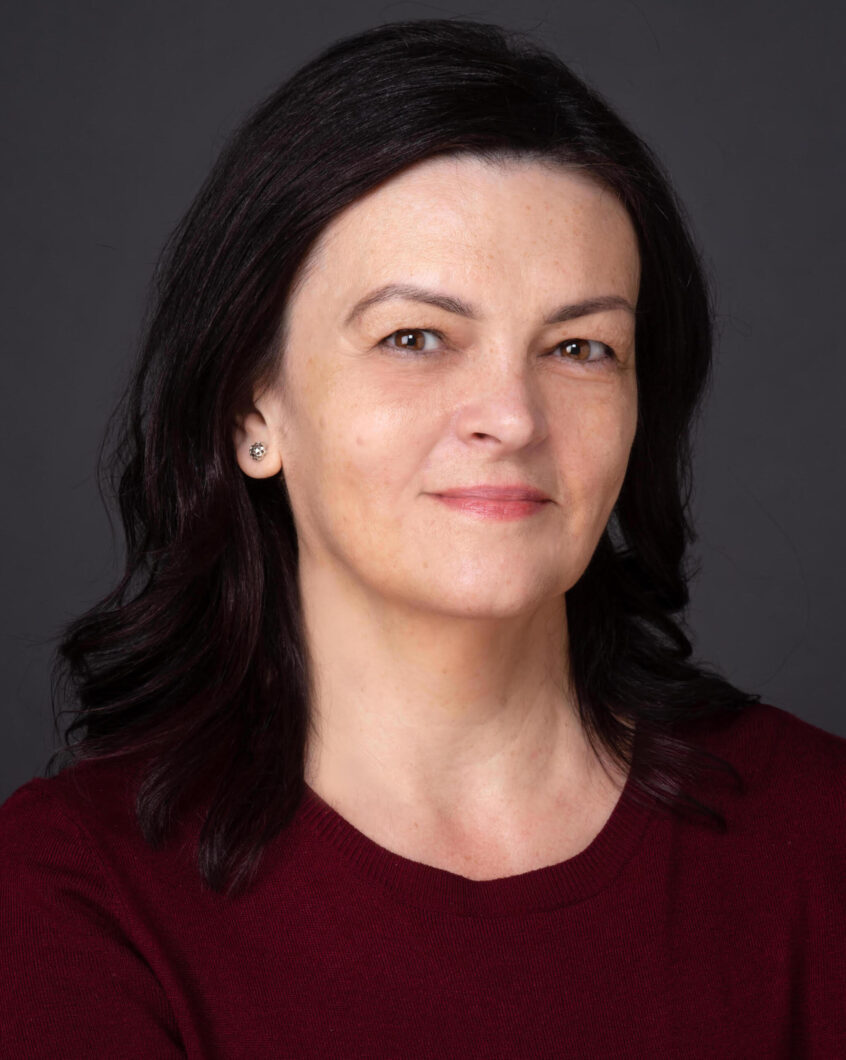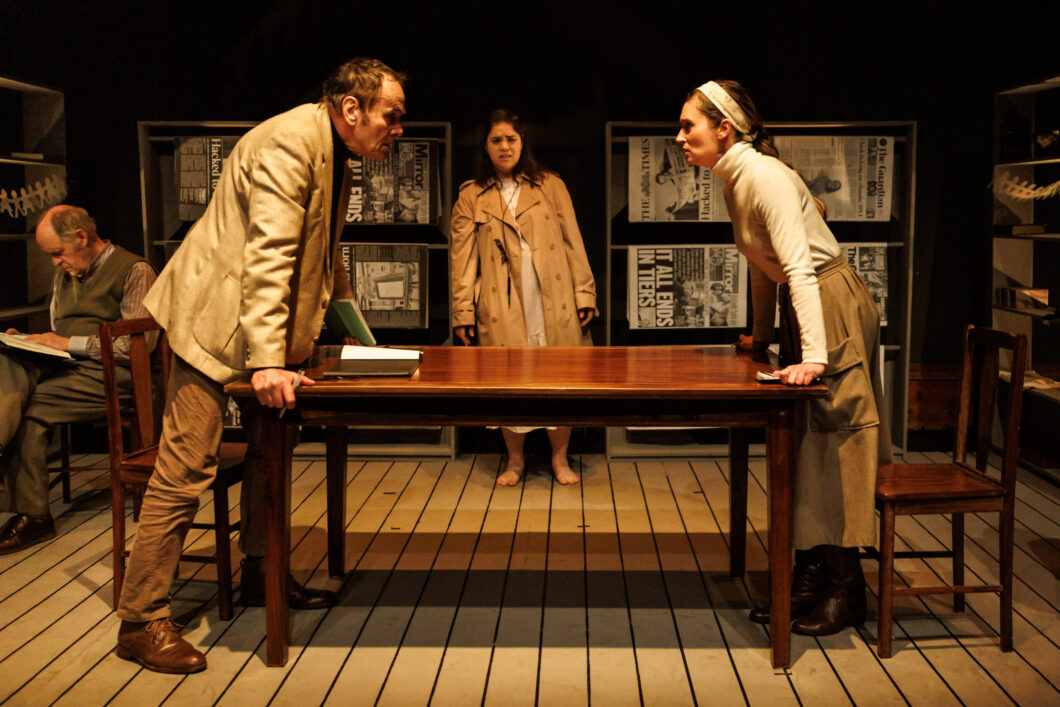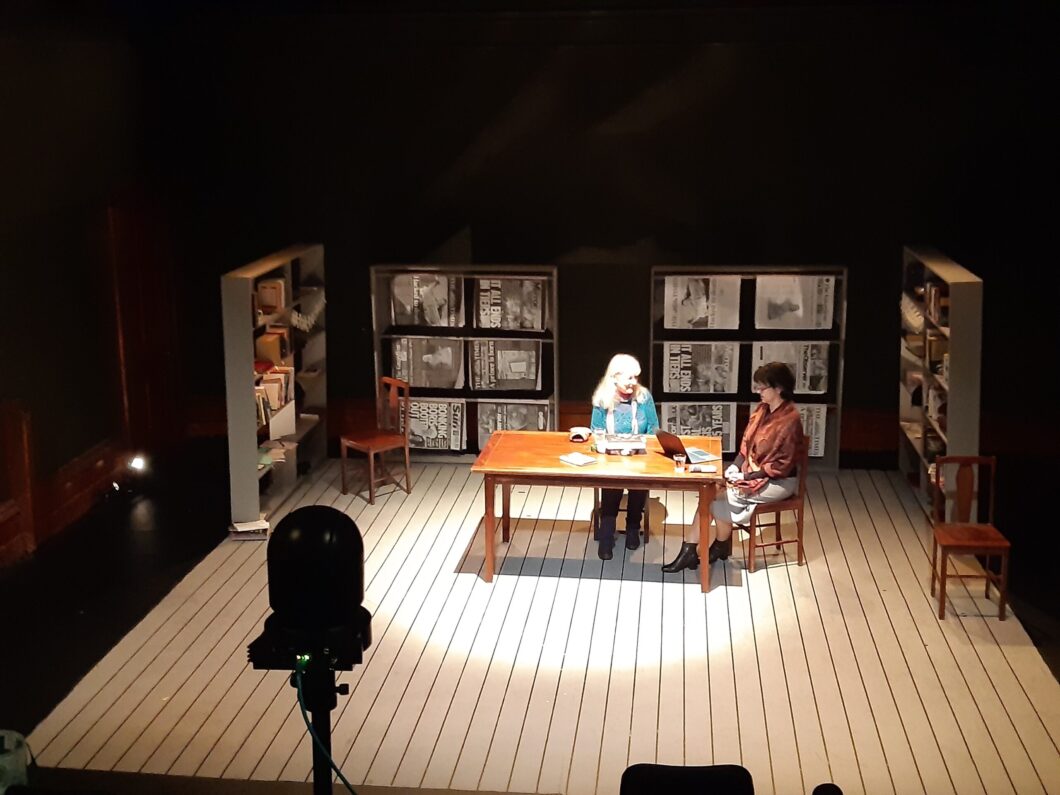SPECIAL FEATURE: LITERARY TRANSLATION, PART 3
In 2021, playwright R. Johns engaged literary translator Cristina Savin to translate her play Birthday Book of Storms into Romanian. As Cristina familiarised herself with the play’s back story – a tragic literary relationship in which R. Johns has a longstanding interest – they found themselves in deep and involved dialogue. Their conversations traversed the languages scattered around the play’s English text, exploring the symbolism of certain words – such as some bird names – in different cultures. Two years on, they discuss the process for In Touch:


TRIGGER WARNING:
THIS ARTICLE CONTAINS THEMES THAT MAY BE DISTRESSING TO SOME PEOPLE
TED: (GIRL staring at him) What’s she doing at that rock pool?
ASSIA: Reciting. Nursery rhymes.
TED: (staring back at GIRL) Strange your daughter.
ASSIA: Yours.
TED: Always staring. Why does she stare so?
ASSIA: She loves you.
TED: Like she’s looking into my soul.
TED: (TÂNĂRA, privindu-l insistent) Ce face-n băltoaca aia dintre stânci?
ASSIA: Recită. Poezioare pentru copii.
TED (privind-o pe TÂNĂRĂ insistent): E cam ciudată fiică-ta.
ASSIA: Vrei să spui fiică-ta.
TED: Mă fixează cu privirea. De ce?
ASSIA: Te iubește.
TED: Parcă se uită direct în sufletul meu.
R. Johns:
As a playwright my interest in American poet Sylvia Plath spans decades, and led me on a further journey to Plath’s husband (the British Poet Laureate Ted Hughes), Assia Wevill (a refugee of Russian-speaking Latvian, German and Jewish descent), and the tragic triangular relationship between these three in the early 1960s.
My first stop was the archives of Emory University in the United States, where I immersed myself in studying letters from Ted to Assia that document the secret relationship from which their daughter was born: a forgotten child I call the Girl.
The Girl’s short life, against which her parents’ conflicted relationship was acted out, inspired me to write my play Birthday Book of Storms. This work is my own imagining of Ted and Assia’s story against the backdrop of this barely lived life, the Girl’s life. An innocent witness to their tragic relationship, this child investigates their lives in a magical surrealist temporality.
The characters’ intertwined destinies and their extreme emotions assume Greek tragedic proportions in a story orchestrated by two powerful women, the rivals Sylvia and Assia – a story in which one choice can have catastrophic consequences. The mytho-poetic world of Hughes and Plath, and the obsessions of Assia haunted by her rival Sylvia, are the framework for this play as the text descends into a world of memory.

So, the setting of my play is a magical realist library which transforms into a number of other settings – a beach, a garden in Devon, a flat in London, a park – as traumatic events are brought to the foreground in a narrative that transitions between the real and the fantastical.
Cristina:
As I reached the end of the storyline on my first reading of the original play, I was struck by the power of emotions expressed in the final words. It was this moment that set the tone for my subsequent translation. While the play may be described as a love triangle, to me it is a story of love, deception, truth, understanding and forgiveness through the eyes of the Girl (age uncertain). And it is Girl with a capital ‘G’ because throughout the play you refer to Ted and Assia’s daughter Shura as Girl, enhancing the mystery around this character as we wait until the final lines to find out who she is:
Meet Alexandra Tatiana Elise. Known as Shura-
Know me
The one who finds the truth.
This is why I decided to translate the play with a sense of innocence, and to keep the focus on the narrative as I retold the complex, bittersweet and lyrical tale in Romanian.
Your translation is lyrical, and this is precisely how I wrote the play – thinking of a story that is both haunting and lyrical. Yet, while there are references to the theme of suicide (as first Sylvia then Assia took their own lives while involved with Ted, with Assia taking Shura’s at the same time), these are counteracted by the child’s desire to live and deliver a message.
But in this imagined story no one takes care of Shura, the Girl, and at times she is forced into an independent existence. And her wisdom does not arise from life experience, as she didn’t have the chance to experience life, but from her supreme sensitivity to relationships and their dynamics.
The dynamics you mention have deep layers, as the Girl’s world is shaped by the psychic space of the parents. But there is more to it, and as a translator I was mesmerised by the rich, sometimes dark dialogues between Sylvia and Ted, and also between Assia and Ted.
You ocasionally punctuate the dialogues with multilingual lines to mark the richness of Assia’s German, Latvian Russian and Jewish background, and for me – as a translator – it wasn’t a difficult choice to maintain the presence of three languages in ‘my’ version: keeping the Russian and German words and phrases, while translating the English into Romanian.
And just like you, I immersed myself in reading and research to gain a sense of the poetic encounters between Ted and Sylvia. In fact, the Hughes–Plath relationship is told – from Ted’s side – in Birthday Letters, the collection of his poems (written over a period of 25 years) that inspired the title of your play.
These readings helped me unlock some mysteries, especially as I worked on my translation of the words ‘lastochka’ (Russian for the martin, a smaller relative of the swallow) and ‘crow’. The latter inspired my choice of the play’s title in Romanian, Scrisorile corbului, the English back-translation of which is ‘The raven’s letters’.
I also wanted to reach deeper into the mysteries surrounding the bird itself. In the documentary film Seven Crows a Secret, Ted Hughes himself reads from his famous work Crow, and this remarkable piece of footage is followed by a discussion of the bird’s mythic history. I obtained further insights into the symbols and beliefs surrounding the crow in my own culture from a comprehensive dictionary of Romanian folklore.
Hughes’s Crow was written after Plath’s suicide and during his relationship with Assia and their child, and the crow became a central image in the play. I recall our many conversations and reflections around the meaning of the word ‘crow’ in particular. We delved deep into different cultures, religions, mythologies and folklores to grasp the complexities behind this one word, and this helped us unpack and explore the layers of Hughes’s complex personality.
Yes, our discoveries were quite amazing: in some cultures the crow is associated with good luck and fortune, in others with wisdom, wit or selflessness, and occasionally it is associated with mischief. Interestingly, in Christianity, its relative the raven is sometimes interpreted as untrustworthy (much like Ted?) due to its failure to return. In Romanian folklore the crow symbolises intelligence, is believed to be able to steal or provide food (in an altruistic sense), and is thought of as a traveller between worlds who can foretell death.
The crow’s symbolism and many faces aside, I was torn between translating ‘crow’ directly as ‘cioară’ and choosing a darker, more powerful option – that of the word ‘corb’ (‘raven’ in English, a larger member of the corvidae family of birds). In the end, after much consideration and discussion, we both agreed that ‘corb’ (hence Scrisorile corbului) is more fitting with Ted’s profile.

GIRL: (trepidation, not sure) Is Crow here?
NIGHT LIBRARIAN: I hate crows.
GIRL: If you cross your eyes like a crow you can see the past and future.
NIGHT LIBRARIAN: Don’t! Stop those silly mannerisms. If you mention that bird again, I’ll throw you out.
GIRL: Is it a lie? The Day Librarian said Ted dedicated “Crow” to Assia and Shura?
NIGHT LIBRARIAN: Dummkopf. Ted was such an idiot. If Assia was a bird she’d be an owl. Only owls can see at night.
GIRL: I’m scared of owls always living in the dark.
NIGHT LIBRARIAN: You can be – lastochka, little swallow. The swallow sees in daylight. You can protect the owl. If crows find owl in daylight they will mob and kill it. But if owl finds crow at night. It will tear its head off.
NIGHT LIBRARIAN AND GIRL:(laughing, together) And suck out its eyes.
TÂNĂRA: (trepidaţie, nesiguranţă) E aici Corbul?
BIBLIOTECARA DE NOAPTE: Urăsc corbii.
TÂNĂRA: Dacă-ți încrucișezi ochii cum face corbul, poți vedea trecutul și viitorul.
BIBLIOTECARA DE NOAPTE: Te rog încetează cu prostiile astea. Dacă pomenești iar de pasărea aia, te dau afară.
TÂNĂRA: E o minciună? Ea a zis că Ted a dedicat “Corbul” Assiei și Shurei?
BIBLIOTECARA DE NOAPTE: Dummkopf. Ted era atât de idiot. Dacă Assia ar fi fost o pasăre, ar fi fost o bufniță. Doar bufnițele pot vedea noaptea.
TÂNĂRA: Mi-e frică de bufnițe, trăiesc numai în întuneric.
BIBLIOTECARA DE NOAPTE: Tu ai putea fi – lastochka, micuţa rândunică. Rândunica vede pe lumină. Poți proteja bufnița. Corbii, dacă găsesc o bufniță în timpul zilei, o încolțesc și o omoară. Dar dacă bufnița găsește un corb noaptea, îi smulge capul.
BIBLIOTECARA DE NOAPTE ȘI TÂNĂRA: (râzând, în același timp) Și-i soarbe ochii.
Our reflections around translating the meanings behind words such as ‘crow’ and ‘lastochka’ (‘little swallow’, a lovely Russian word which is carefully preserved in your translation) gave us the idea of staging a Romanian reading of the play.
This idea then became a cultural project. In August 2022, in the same week as it launched the original English version of Birthday Book of Storms, Melbourne’s La Mama theatre also staged – for the first time in its history – a bilingual discussion (also screened online) of the translated play that catered for multicultural audiences.
Yes, my family and friends in Romania, the UK and Canada were amongst those who watched this! On stage at La Mama, we had the opportunity to introduce to our audience a video of a Romanian reading of excerpts from my translation, filmed in June 2022 at the Vasile Alecsandri Theatre in the city of Iaşi, Romania with a group of talented actors.
Following its Australian and Romanian adventures, Birthday Book of Storms will continue to delight audiences at the Hannah Playhouse in Wellington, New Zealand in a season scheduled for 2 to 10 August 2023, before taking the world by storm (pun intended) later this year and through 2024.

Cristina Savin is a French–English / Romanian–English freelance translator and professional editor. She holds a master’s degree in translation and a PhD in translation studies from Monash University. Cristina has been working freelance since 2017 and has completed translation projects in various settings including Commonwealth law enforcement, authentication of artwork, health care, medical, education and literature, as well as a subtitling project for the European Union.
Born in South Wales, UK, R. Johns holds a BA in drama from Manchester University, UK and a Master of Fine Arts (MFA) in theatre/acting from the University of California, Riverside. She is a recipient of a grant from the Australian Government’s Anzac Centenary Arts and Culture Fund for her play As Told By The Boys Who Fed Me Apples, which was also nominated for an Australian Writers Guild Award for excellence (known as an AWGIE), while Birthday Book of Storms was nominated for a Griffin Award. R. Johns’s work has been recognised internationally. In 2017 her play Black Box 149, translated into German by André Horst Bastian, was performed at the Staatstheater Nürnberg in Germany and also featured in the ‘Australia now Germany’ program of the federal government’s Department of Foreign Affairs and Trade.


